
Want all the hottest music and gear news, reviews, deals, features and more, direct to your inbox? Sign up here.
You are now subscribed
Your newsletter sign-up was successful
Thrice have had a fascinating journey; from intricate post-hardcore fury to four-part concept albums based on the elements, they are bonafide progressive band that rarely gets tagged as one. A three-year hiatus saw them much-missed but making an assured return in late 2014 has now delivered a trio of superb records; with the latest undoubtedly the most experimental.
It's an album that suggests the Californian band are just getting started on a new exciting era. You want prog? Try a jazzy riff based on the Fibonacci sequence. But no matter where they explore on 11th album Horizons/East, Thrice are anchored by the melody and humanity embodied by singer/guitarist Dustin Kensrue.
We talked to Dustin about how the US band challenged themselves this time around – literally so it turns out – and also took a deep dive into tones and the world of Line 6 Helix with him. An amp and effects modeller that he's proved to be a persuasive ambassador for.
How did lockdown impact the record and the creative process for you?
“It's like that kind of thing where I think everyone is telling themselves at the beginning of the lockdown that you'll be productive and whatever but it was really rough on just getting motivated in the beginning, I think. Especially since we weren't gathering in person. We have some family members who are immunocompromised so we're trying to be really careful and it took a while to get the momentum rolling, to really get the writing firing back and forth.
The good thing is we had already kind of been prepared for how to make a record when we're not all in person all the time
“Once that started going we also still had to finish building our studio that we've been working on. So it's been like a functioning practice space for a bit but there was more work to do to get it ready to actually record. So it's a lot of stuff going on that I think ended up being responsible for why I think there's a larger gap between this record and the last – more than most of our albums.
“But the good thing is we had already kind of been prepared for how to make a record when we're not all in person all the time, because for the last two records, someone's not lived close. So we've done a lot of sharing online with each other and gotten good at collaborating and then getting together for shorter periods, jamming stuff out and taking it back home to work out.
Want all the hottest music and gear news, reviews, deals, features and more, direct to your inbox? Sign up here.
“So we ended up having a pretty similar process with this one. We got together and we shared a lot of ideas and worked some of those out in person with everyone wearing masks in there… it's annoying, but you get through it and we went back and worked some more and then we were finally ready for the recording process.
"As annoying as it is to make a record with masks on, it was really great to have our own space again and it was totally ready to record in. The space that we had in the past was very, very small and this place is bigger so that's really nice."
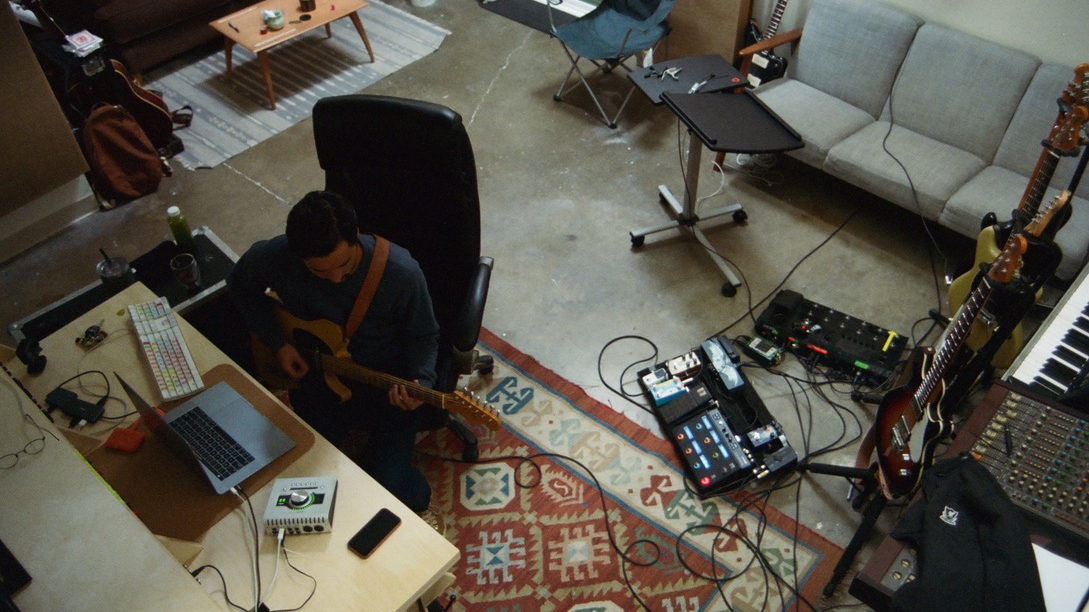
So that space is like a Thrice HQ now?
"Yes, it's the first time we've had everything in one place with all our storage. We've got some space to work on stuff in the front if we need to and someone's in the big room. It's not huge but it's the perfect size for us.
Was there much of the writing in a room together in addition to sharing files?
“It was that middle section. We’d share all these ideas, talk about them, move forward and then we all get together and jam on them. That's when a lot of the stuff really solidifies in terms of where we're going with it and then a lot of new kind of creativity happens in that time period. A ton of the vocal Melodies are going to come out of that period and songs will find their direction and then we'll build on that some more.”
One of the bigger themes on the record is just talking about the ways that we actually perceive the world
Was the world's reaction to the pandemic feeding into the themes of this album?
“It’s weird because I didn't use to think about it this way but I’ve realised that writing is kind of the last piece of me processing things. And so as I'm writing I'm realising I have to find the words to actually get this out of me in some sense.
"I don't usually know going into it like what I actually want to write about or what's going to come out, but as it starts to form together I realise, oh yeah, this is me really thinking through some of these issues. It's not always about a super current thing but whatever is happening is part of the air I’m breathing while I’m writing and very much affecting it.
“One of the bigger themes on the record is just talking about the ways that we actually perceive the world and allow ourselves to perceive the world, or are allowed by others and our social groups and our world-views. And I think that whole idea, we've seen that on display.
“You can be standing next to someone and you feel like you're experiencing the same world but the way that your brain is filtering certain things in and out, you're experiencing a very different world sometimes. That's hard and confusing. A lot of the record is about that about how to maintain relationships across that gap, how to hold out hope that people can change their minds sometimes.
This time, we did something a little different where one of the ways we tried to create those boundaries was to make this challenge list and it would just be random stuff
You’re always evolving with each record, adding new elements, but keeping this core that’s undeniably Thrice. Do you have a kind of clear idea in your mind going into each creative process of what specific new things you want to explore musically?
“We generally don't. That's kind of the big challenge because we've done a lot of different kinds of sounds and textures and styles. It feels very wide open, which is actually a hard space to be creative in because you don't have enough to push against. So that's why we're always trying to look for different ways to create boundaries for ourselves.
“Something like The Alchemy Index is like the best example of that where there were very defined boundaries that helped inspire the sound of the music and the lyrics. It was a ton of fun – we've never found another idea that we liked quite as much as that one. But we're always looking. So this time, we did something a little different where one of the ways we tried to create those boundaries was to make this challenge list and it would just be random stuff.
“For example, on a record we heard a band did this weird stop on it, so why don’t we try something like that. Or the two examples that I've been bringing up, just because I feel like they're pretty apparent on the record, is the fourth track Northern Lights. There's kind of a crazy-sounding guitar lead, and it's from one of the challenges where Teppei [Teranishi, guitar] asked, ‘What if we write a riff based on the Fibonacci sequence?’ And so he mapped out distances in the scales and then took a couple notes out to give it some variety, but it sounds really cool. Kind of off-the-wall.
“And then on that same song there another challenge was using quartal chords, which are chords that jazz musicians started using back in the day because they're a little less defined and so they can float over things a bit differently than standard chords which are built more on triads. So that song has that going on too, in the verses.
“If you force yourself to do this one thing now, that becomes something for the rest of the song to play off and that's always fun."
Was that the most challenging song? Because it’s effectively Thrice playing jazz rock
“It had its own unique challenges. I think at first a lot of times we’ll have a song where the music feels like, man, I don’t know how I'm gonna sing over this! It's not going to be very melodic and I think it's just going to be something super monotone. But I ended up kind of playing with that monotone and then actually finding some of my favourite melodies on the record. It just takes time sometimes.
“It was similar with Still Life on the record. The riff sounded very broody and a little discordant. Everyone thought that whatever that song was going to be, it probably wasn’t going to be very melodic but it ended up being quite melodic while still having those tones in there. It's hard to tell sometimes until you spend a little a little time with something.”
Is there anything from your list you either didn’t get round to or just couldn’t manage to do?
"There was a lot. I’d have to pull it up, but it was just a bunch of stuff. There’s only so much room in a record. You could make a really long record but then you have like four vinyls and that's not fun for anybody.
“We've been trying to keep things on one vinyl record because I think there's something kind of great about that time length.
And you’ve done the multi-vinyl approach with The Alchemy Index before
“Yes but that makes more sense because each of those things is a separate record.”
With Robot Soft Exorcism I've seen a bunch of people going, ‘Oh yeah cool it's Radiohead-y' and then every single person will quote a different Radiohead album or song
The way you’ve integrated synth elements on this record and on Palms brought to mind Radiohead as well, and now it’s become part of the sound in quite a seamless way. Did that side of things come from you?
“Well we’ve all loved Radiohead forever, I can definitely walk you back through all our stuff and tell you where that influence is. People are hearing a lot of that on Robot Soft Exorcism especially. What’s funny though is I realised I had a similar thing happen on Scavengers where we were making a playlist for Spotify, it was like Spirit Of Horizons East, and that song originally was called Revolt, after this band Colour Revolt who we all like. When I’d written the original demo I was like, 'Oh man, that really feels like very Colour Revolt-y' and I was sure I was half ripping off some song.
"Nobody thought it was a problem so we went on and then when I was trying to find do the playlist I was like, oh I should find what song this is kind of reminding me of. I went through all their songs and it doesn't sound like anything at all that they’ve done but it somehow still feels that way to me, right?
“So a lot of times you can have a strong influence and realising it's hard to pin down what it is and with Robot Soft Exorcism I've seen a bunch of people going, ‘Oh yeah cool it's Radiohead-y' and then every single person will quote a different Radiohead album or song.
"Because it doesn't really feel like one but clearly there are influences in a cool electro beat or an arpeggiated guitar. All of which on their own aren’t anything but blending them in certain way evoke some kind of spirit of Radiohead or something.
“So that influence is coming from everyone. That song came from me figuring out that beat. I took a drumbeat and tuned [the guitar] to where some of the drums were resonating. At the beginning of the song it’s just the effected drums and me singing over it and the mixture of the melody, the tone and the drums makes you hear the key that's going on and even chord shifts that aren’t happening yet.
“I had that beginning. I was like, there's something here. There's just something kind of cool about this part. That was actually one of the harder ones because I knew there was something there, but it took a while to land on the final dynamic movement of the whole song. It was a little too flat for a while, or it started too high and didn't come low enough. So we expanded the dynamic range a little."
When you’re coming up with guitar parts for Thrice in song ideas, are you putting the vocals on the backburner in your mind, in contrast to your solo work?
“That’s a good question, I think the main difference would be that a lot of the solo stuff would come from chords and melodies at the same time, whereas the Thrice stuff is usually coming from one of us having some kind of purely instrumental idea and then sing over that. It’s pretty rare that a vocal melody starts a Thrice song.”
I haven’t sung in the lower register for Thrice stuff often because honestly a lot of it went back to hearing myself in the practice space
At the same time it’s really striking how your voice has developed over the years as an instrument in Thrice - for example, Scavengers is quite a low register song for you vocally.
“It’s funny, I haven’t sung in the lower register for Thrice stuff often because honestly a lot of it went back to hearing myself in the practice space. I would sing louder and higher, and a lot of the songs are energetic and that’s adding energy to it if you sing in a higher register so that’s always a hard call. And I end up writing things where I kick myself later. Now I have to sing that live!
“Sometimes when we have a song that has some leeway to move I’ll sing out in the room so the guys can just hear my voice and I'll do it in a couple different pitches and we'll evaluate. Like, okay, part of that sounds really cool there, but when you brought it lower, there’s kind of a cool vibe to it. I think that was one of the songs on this record where I was pushing it. I wrote it and now when I actually did have a melody on it, I brought the guys and then we talked about pushing it around and ended up realising there's something cool about keeping it kind of low. It just added a different character to it.”
I alway get the impression that your songwriting ideas are inspired by plugged in sounds with the guitar and electronics. Are you usually sitting at home with the guitar plugged in?
“Yes it's interesting. I use Line 6 Helix so it's actually really versatile. I can use that on the computer or just the pedalboard plugged in and have the exact same sounds that I do live which is really helpful. But it is different whether you’re on acoustic guitar or electric at your house, or you're in the studio actually having sound hitting your body. You'll write differently in a different situation.
“So there's definitely been a lot of ideas that have been like the starting points of things that are from just being in the room with a loud amp and it pushing you to do something different and exciting so you think, ‘oh that’s cool!’ If I’d been home I wouldn’t have realised it was moving me and taken a song idea from it."
How important has the Helix been for when you do write at home?
“It's really great. It's really good for practicing. We're getting ready to tour now and I have my whole rig backed up here. It sounds the same and I can play it over the songs. And it's very easy to find the sounds that I want in the studio too. It sounds fantastic – I have like zero complaints about it but I would always want more processing power. But other than that, that's just because I want to layer all the cool stuff in and it has limits in reality. "
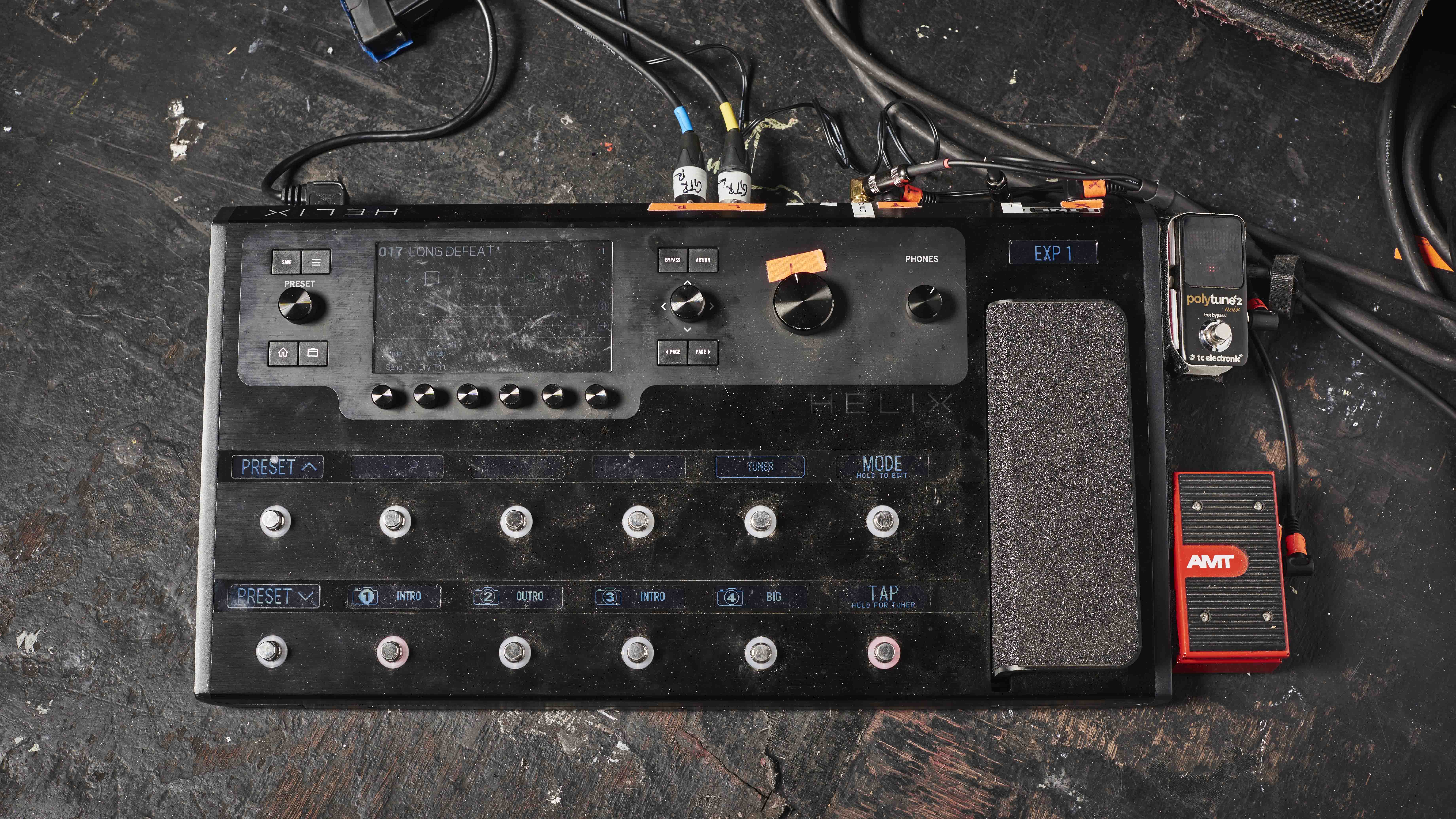
It’s good to hear that you’re still loving the Helix but do you miss physical pedals at all in any way?
“Physical pedals are definitely fun to play with. There’s really niche stuff that's super cool, but in the end I got really sick… like the main reason I was looking for something that was a bit more contained was consistency. Especially showing up at a fly date show and I'm using some amp. You specify this specific box and whatever and you show up and it's something weird, it sounds crappy and you're trying diall your in-ears with it. It takes away all the headache. I know exactly what sound is happening all the time.
“Then there’s having a bunch of physical pedals plugged in. This is partially my fault because I’m not great at making things neat and tidy, but the pedalboard would be a mess. It's getting thrown around a bunch and you get one spot, one connection that gets messed up and for the whole show you're trying to troubleshoot what it is. So the less points of failure is fantastic.
“Then also playing live. I'm singing the whole time so I can't really be doing the super complicated pedal dance. Something where I can hit one button and have a bunch of things shift is helpful. But until Helix the tones were pretty good but it just never felt perfect, and then I had zero complaints with Helix. So that level of the modeling that they did definitely was a game changer for me.”
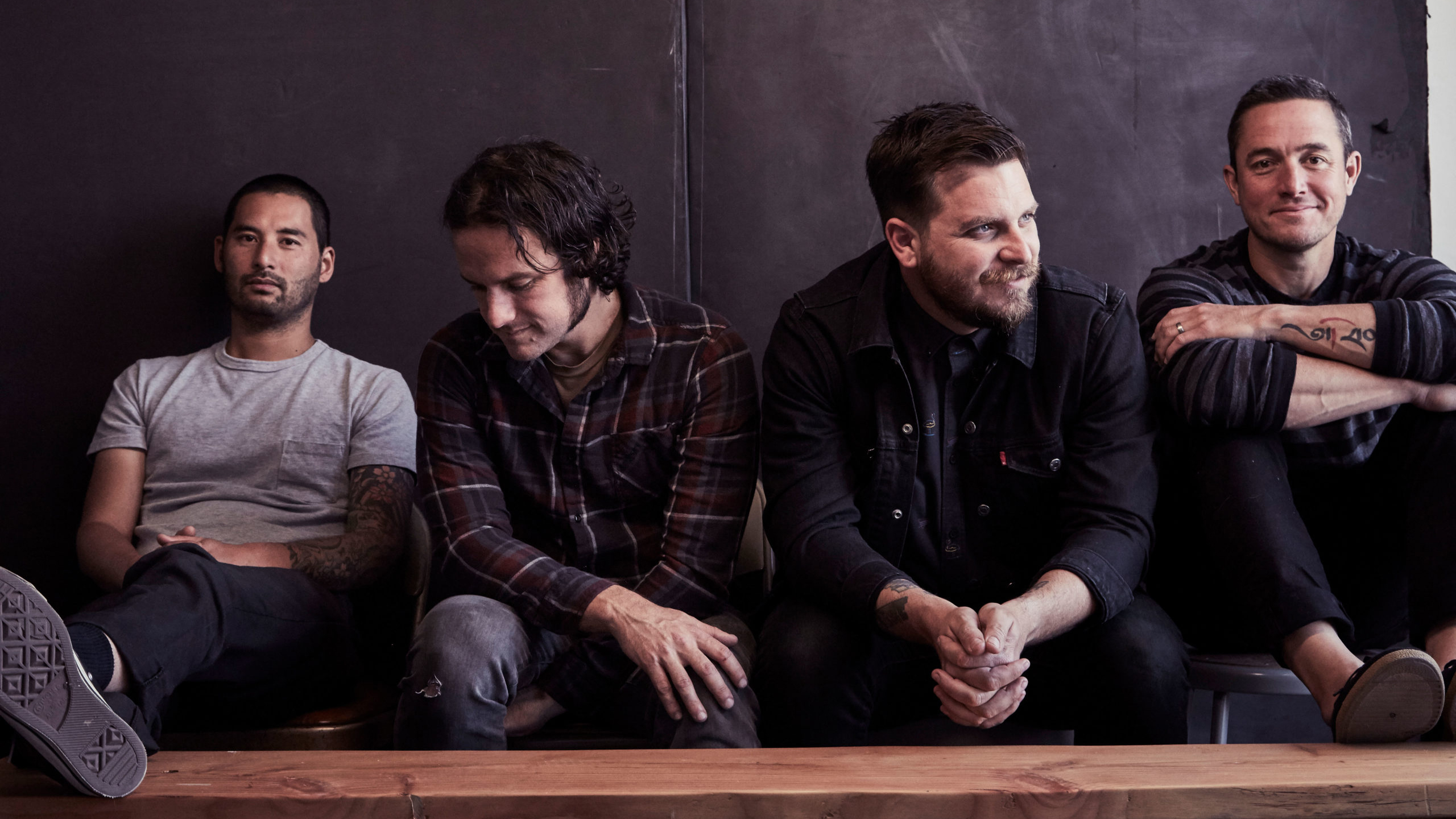
Would you say you and Teppei are quite practical with your gear approaches? You clearly know what you want because the detail and overdrive tones on your records is striking, but you’re not romanticising about vintage gear?
“Teppei is much more of a collector than I am. He's using physical amps. Both him and Ed [Breckenridge, bass] have the HX Effects, which is basically all the Helix effects but not all the amp stuff. So they use that alongside real pedals. It’s nice just space-wise to have something that’s like a Swiss army knife when it’s a case of, ‘ Oh, dang, on this one song we have parked wah on it and I don’t need a giant wah on my ‘board for every show.. So that's really helpful, but he does have a bunch of cool old guitars and gear.
“I sense in myself that if I would let myself, I would get sentimental and want to collect things but part of me really doesn't like owning things I don't use all the time. And so I literally have no electric guitars right now that are not my model with Music Man, just because it does what I need it to do and I just hate having something that I'm not going to use. It makes me feel weird.
“There’s times where I'm like, man I wish I hadn’t sold that guitar or whatever. But I’ve always been like that way where I just turnover [gear] when I'm looking to sell this to get that. I'm not just collecting stuff to keep in a closet, but it is nice to have Teppei’s large stable of guitars to pull random things out sometimes.”
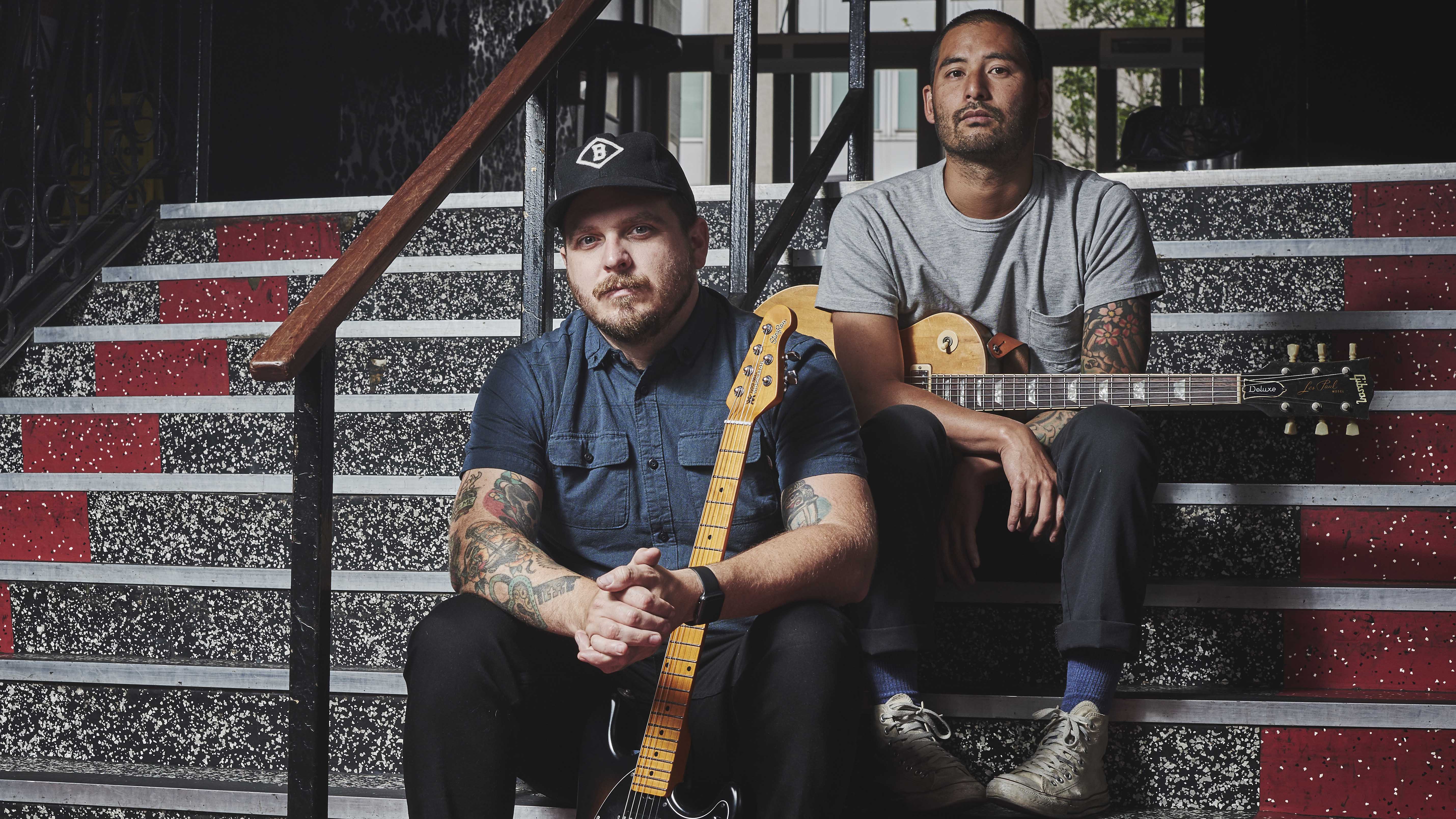
I feel like I went on a crazy gear quest
So you don’t even have your Nash guitars anymore?
“Nope. I don’t have any of my SGs… nothing.”
You should give classes to guitarists on how to part with gear!
“[laughs] I just learned to be brutal with it. Don’t think about it, you don’t need all of it. I feel like I went on a crazy gear quest, which is funny because the thing that started it was when I was at a Manchester Orchestra show and I was hanging out with Andy [Hull] telling him, ‘Your guitar sounded so good’ and it was literally one pickup through this Fender amp. It started me on this weird quest and that's when I had this Nash stuff and then I was changing out gear all the time.
“It’s nice now with the Helix and the artist series from Ernie Ball, I’ve been able to really dial in, and this is what I actually need. I'm not jonesing for some new thing all the time. I don’t want to get started on that path and then sell everything I have again. There's just not enough to worry about now.”
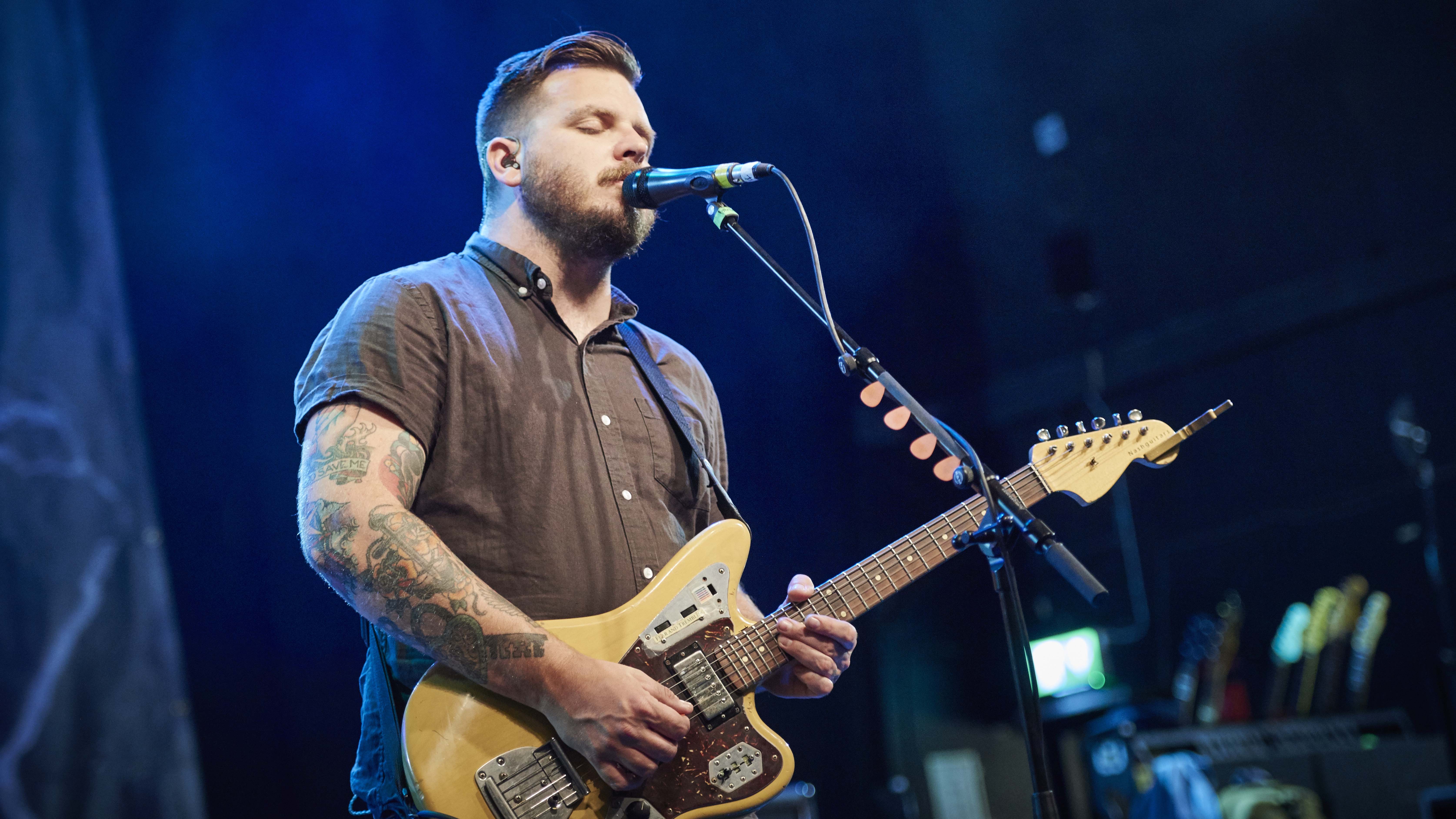

And can focus more on the creative side because you’re not chasing something?
“Yes and I have a pretty set amp tone with the Helix. It’s going through this Fender modelled amp that’s set pretty clean and I have the Minotaur on there, which is like a Klon pedal, and that’s the base tone for 95% of stuff. Then every once in a while I’ll be like, alright I’ll take the Klon out and put this fuzz in, or whatever. But usually the amp stays the same. By keeping that core stuff there I know it sounds good and then I can play with all other the fun stuff, I can do different effects and different things. I can control like the gain, usually with the Klon [Minotaur] pedal.
“Then I have the stereo output on my guitar where I can blend the pickups, which is really fun. But in the end, I know that the core sound is good and I if I was trying to get a different map for every song, I feel like I would get way too in the weeds and then it also wouldn’t sound as consistently good live.There's something to be said for knowing what things to limit. Women, and hold down. It does give you more freedom I think.”
Do you still use the Helix with the Line 6 Powercab?
“Yes I have the power cabs.I use those live and it’s great, I have one up in front of me. We use in-ears but I like to get feedback from a guitar and feel the movement of air a little, so I have one upfront and I have one downstage that’s filling in the sounds. So it’s not just Teppei’s loud guitars over there and nothing onstage coming from mine."
It’s amazing to think someone could buy an HX Stomp, which is relatively affordable, and all your tones from the last two Thrice records.
“You totally could and there's something so appealing about the Stomps. I have moments where I think, I could do it - I could just use that. I have some settings that are too complicated and in a song there are too many presets. But there's a way you could pretty much do it. But for almost any other band I would just have that. I would be so happy with the tiny little thing. It’s great.”
It’s an amazing piece of kit, especially when you take the time to dial in your sound
“I think it's hard to find your initial path of where you're going to go with it. There’s so, so many options.”
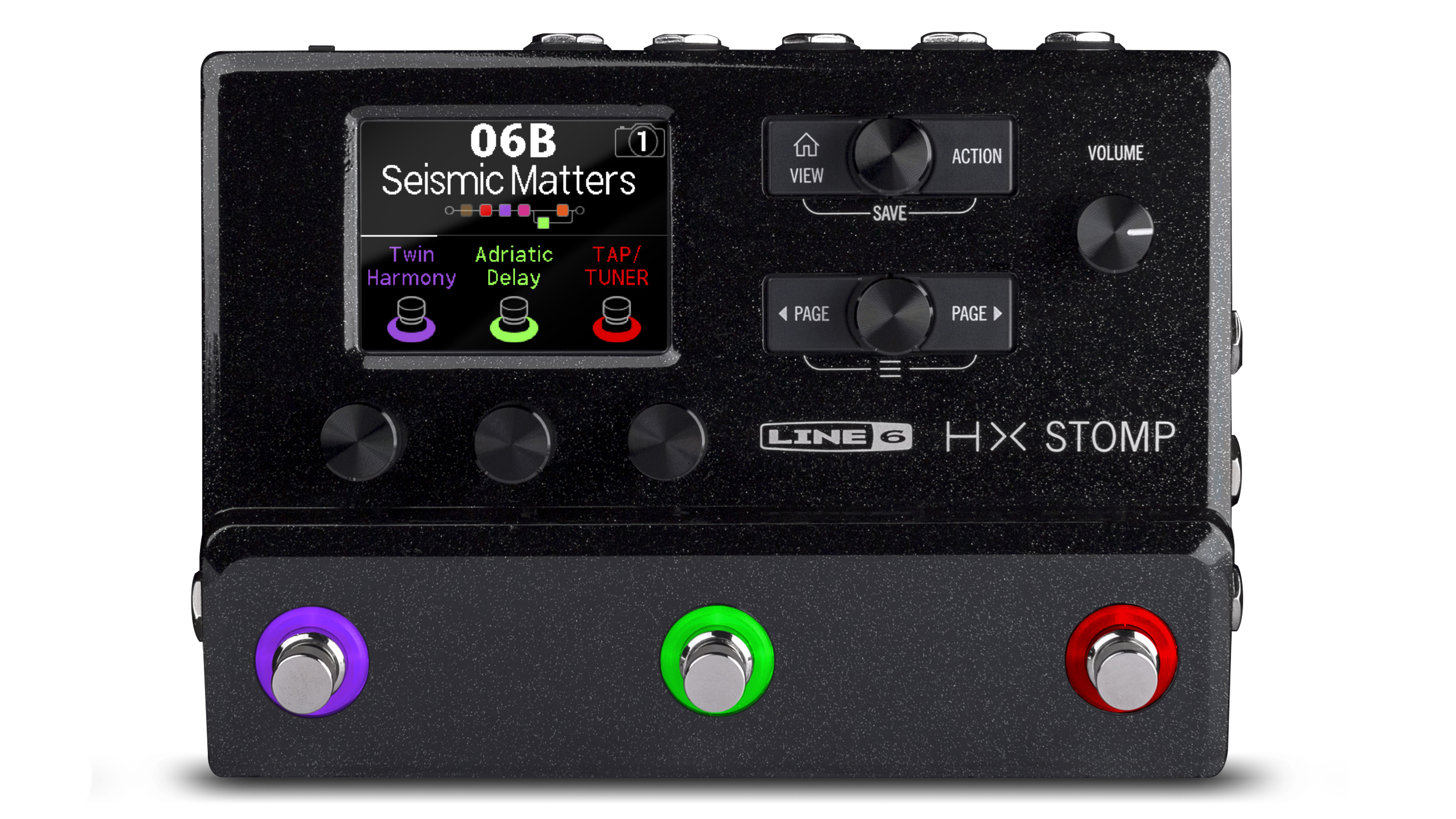
Have you been approached by fans for your specific settings on the Helix?
“Yes, and I've put them out there. Not in any official capacity, but I'll be like, here's the set up on the amp and the pedal. This is the basic tone. They have a store that I just haven't got around to putting myself on, but I'm sure people would probably appreciate that.”
Definitely. There’s some incredible reverb sounds on the record, like the intro in Still Life, is that all Helix?
“Well, mine would be the Helix. Teppei’s is some kind of reverb pedal I can’t remember the name of, it’s a small little pedal but it has a momentary switch that you can hold and it will do this little bloomy thing.”

Thrice: “When we were 17, we wanted to fit as many notes as possible in. We’re minimalists nowadays”
Back when you had pedals you had something like five gain stages so it sounds like a pretty big change for you now
“Man, that’s giving me PTSD thinking about that setup! That was when I was trying to do all the things, but without the Helix. I was using multiple pedals and midi switchers. It was a lot of work, especially as I was controlling the Strymon stuff with MIDI controllers. The Helix has simplified all that, and the Snapshots function is amazing. If people don’t know it’s as if you could hit a button and tweak all the knobs and hit all the buttons on your pedalboard whatever way you wanted, all at once. So that’s super helpful, instead of gain stages I’m using the gain level and the actual level on the Klon pedal there.
"With a lot of this record, actually quite a bit was recorded on the neck pickup or like at least blended more towards the neck pickup. And then on the songs, especially if they're like a heavier thing, I would push the brightness EQ, whatever the middle one on the [Minotaur] is. It's basically going dark to bright, and push that up so that it wouldn't sound dull and you're still getting kind of some of the heft and sometimes belly overtones of the neck pickup. You’re also getting some cool grit. So on Still Life, and probably half the record, my guitar is like that. Which is something I’d been wanting to do for quite a while.
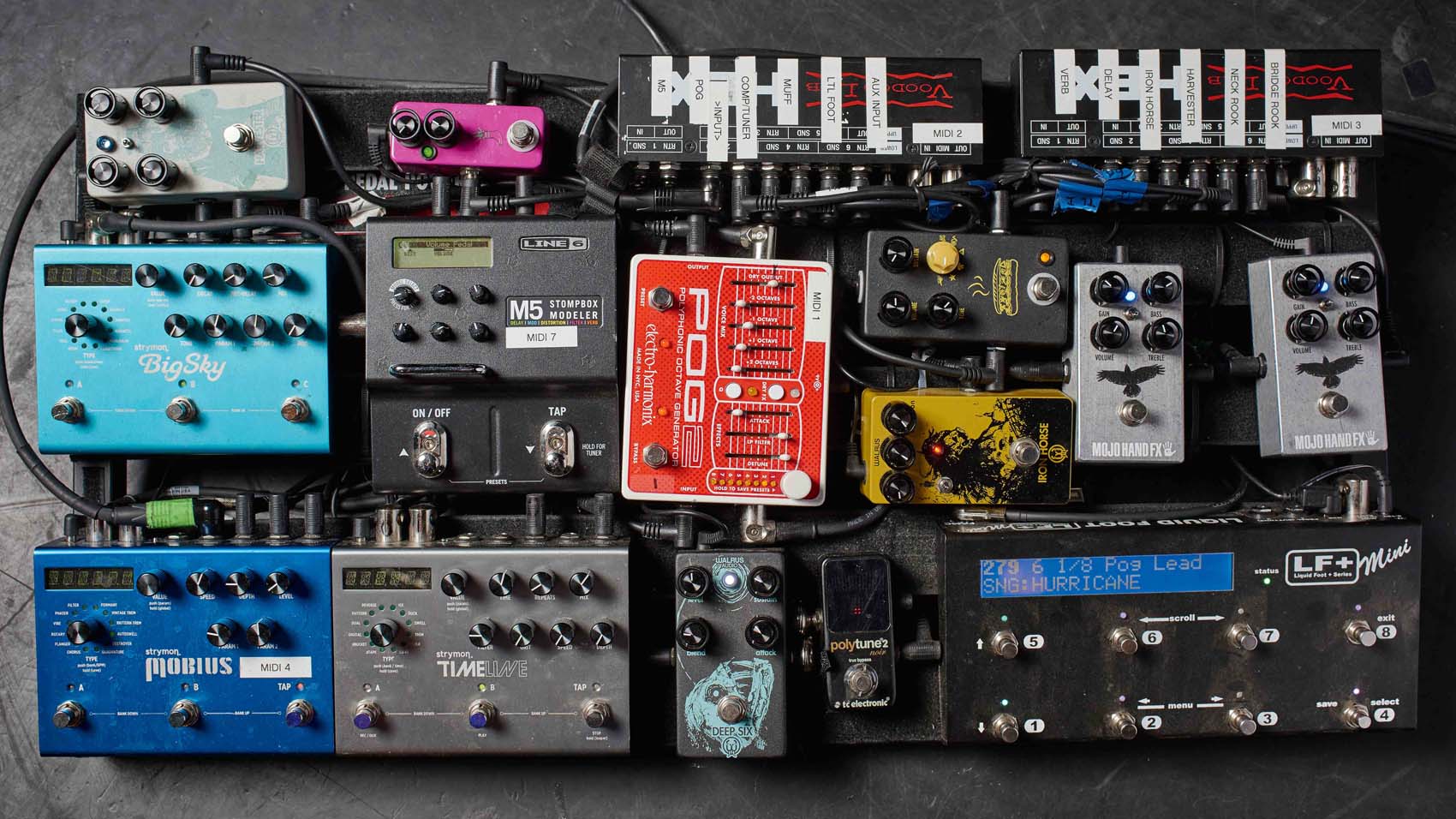
That’s also quite a big change for you
“Yeah, I traditionally used neck sounds more for clean stuff or certain leady stuff but generally not for rhythm. I think that's partially because a lot of times is does get muddy if you're on a certain setting.
"I was actually looking at it for a while when I was going to build up my own guitar and have a switch built into it. I was basically going to match the levels of the two pickups to where you can just switch between them and it would sound great on your amp. Which you can do if you set up certain spots that way. But I realised if I'm using the Helix anyway there's not a whole lot of point in building that mechanically into the guitar.
"So I figured out with the idea of doing separate pickup outputs through the stereo output, I can just do that on very easily by turning a little knob. So that was really fun to get some of those tones."
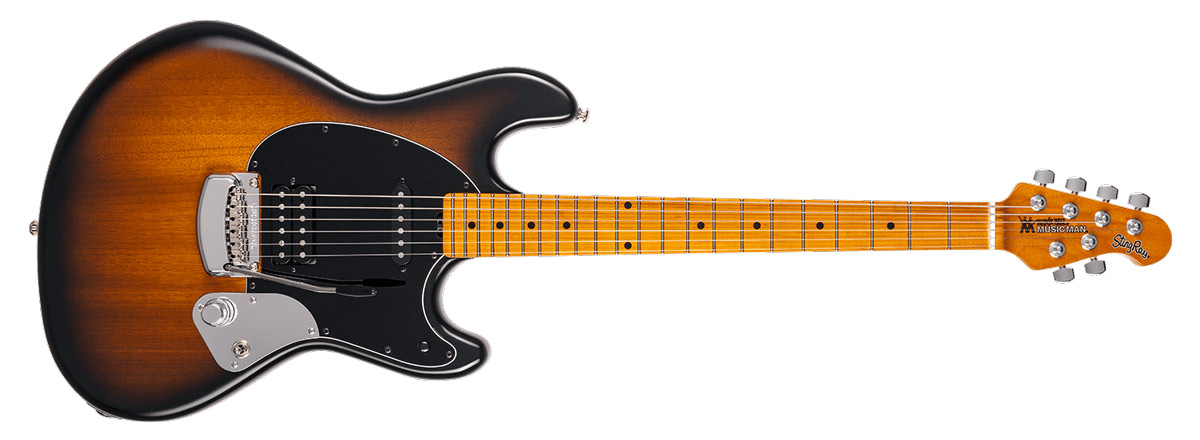
Are we ever going to see a Sterling version of your signature model?
“I hope so, I don’t know. That's been really fun, all that stuff. We thought it was going to come out way earlier than it did, but shit happens and they're always so busy. They’re building to order and building six months out usually and it got backed up.
“We’ve got two colourways for it now and maybe we’ll add another. But it would be fun to add a Sterling model because [the Music Man models are] not cheap guitars. I wish more people could have it becauseI think it’s a simple but versatile setup that I’ve been enjoying a lot.”
Line 6 were doing a firmware update for Helix and asked me to make a setting for it
Are there any new models on the Helix that have been inspiring you lately?
“Yes, the tone on Dandelion Wine, when it gets heavy with this weird tone that’s vibrating, that’s actually a tone I made. Line 6 were doing a firmware update [Helix 3.0] on it and asked me to make a setting for it. So I grabbed four of the cool new things they have put out for it and made this tone. So it’s a Poly Detune, the Pocket Fuzz that was new, a Glitch Delay which was new andthe reverb that has the octave stuff on it.
"So it’s four crazy things happening but they’re all incredibly high DSP and I realised that when I recorded it. I recorded it with that sound but live I can’t actually fit all that DSP on with all the other things I was already using for that song. So I figured out I just had to ditch the Poly Detune and use a chorus instead, and you could never tell the difference live.
"That was fun because I made this crazy ass tone. I don’t know how or why I found it when I was doing that demo but thankfully I did because it’s one of my favourite spots of the record. It’s this weird tones that comes out and attacks you.”

The dynamic between your guitar and Teppei’s always sounds like you're in the room together but it’s carefully voiced where everything had clarity and texture, as well as mid punch. Do you have any tips for bands with multiple guitarists on how to dial in their sound without stepping on each other's tones?
“Heavy music is probably the hardest to mix and record in a way that sounds good. You can do so much with melodies and have a lot of room to play with stuff but once you start layering a bunch of guitars, drums and bass and everything’s loud, it’s very hard to place it so it does matter how you choose your tones.
“We realised the counterintuitive truth that the heavier tone doesn’t always sound heavier, if that makes sense. The more distorted sound doesn’t always sound heavier. We generally don't use super high-output pickups – my Ernie Ball guitar is a pretty medium output. What that enables you to do is the guitar is going to respond more dynamically, so when you did in more you’re getting a heavier sound but it isn’t sustaining forever and when you hit it again, you have a percussive attack which I think affects my playing a lot.
“That plays into how you set up your tone and if you get your tone to where it’s working with a more dynamic pickup, you can have a space where it’s not just like a buzzsaw. On Dandelion Wine it went through a bunch of phases. We had the structure of the song but not the dynamic vibe really yet. And in the studio we ended up figuring out the vibe on those choruses. The closest thing we could think of was Chelsea Wolfe where it’s kind of a nasty tone but it’s actually pretty clean. You feel every string dig in but it doesn’t have a ton of sustain, it has a cool grit and putting some verb on there so you get a weird attack and a spacious thing behind it.
“I guess you have to think through the song and what the song is actually needing, but I do think if you have two guitars, having a different general amp approach [helps]. So Teppei is always going through the Vox and then he’s sometimes got a Marshall with it, sometimes a Supro and then I’m always doing the Fender modelling thing. Then we have different drive pedals, and different guitars too. I think it’s about being mindful of all that stuff. Not overloading everything and then thinking what could fill in that harmonic space that the other guitar is not filling in.”
You’ve done quite a few acoustic versions of songs in the US while promoting albums, is an acoustic tour something the band would consider? You have a lot of material that would work really well for that
“Yes, we’ve definitely talked about it. But it’s the kind of thing that we never know when would be the right time to do it. When you’re in a record cycle you should probably be promoting that record and then when you're done you're thinking, well we should be writing and recording. But yes, I think people would really like it so I would bet money on it happening at some point.”
How are you feeling about gearing back up to tour again?
“Excited, there’s just a lot of uncertainty whether it’s going to happen. It’s looking Ok right now. I mean it’s not looking great but I think it’s gonna happen. It looks like a lot of the venues are at least trying to make it safer so that’s cool.”
Horizons/East is out now on Epitaph digitally. A physical release follows on 8 October. More info at Thrice

Rob is the Reviews Editor for GuitarWorld.com and MusicRadar guitars, so spends most of his waking hours (and beyond) thinking about and trying the latest gear while making sure our reviews team is giving you thorough and honest tests of it. He's worked for guitar mags and sites as a writer and editor for nearly 20 years but still winces at the thought of restringing anything with a Floyd Rose.